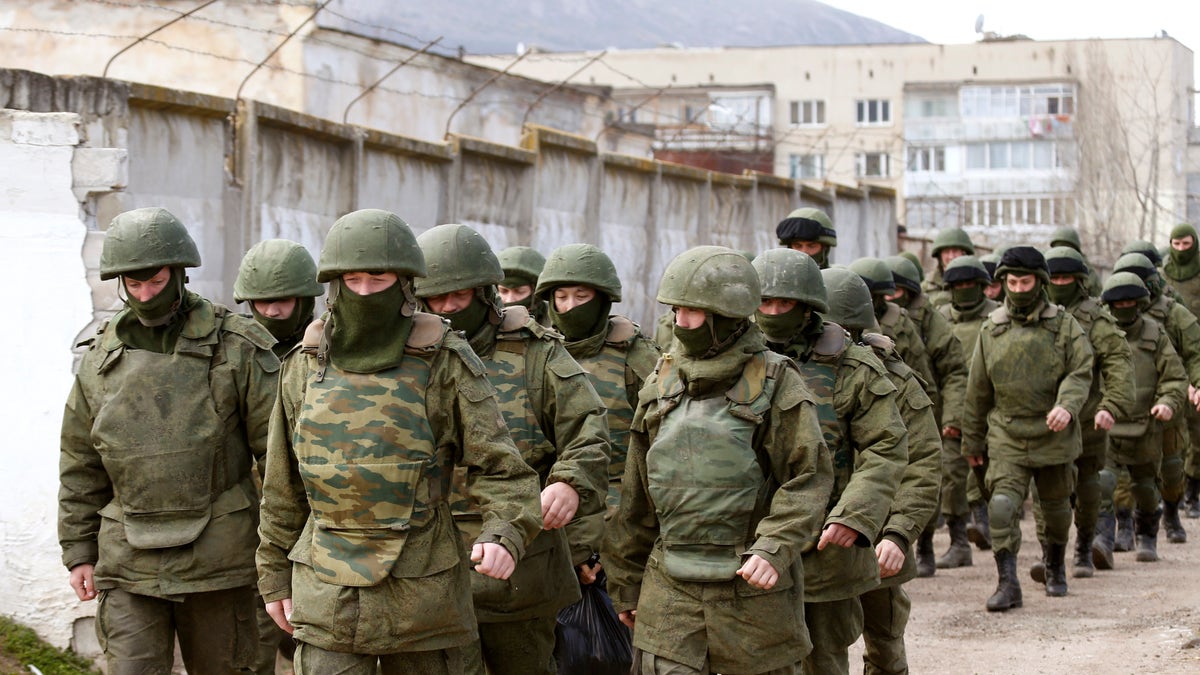
March 14, 2014 - Armed men, believed to be Russian servicemen, walk outside a Ukrainian military base in Perevalnoye, near the Crimean city of Simferopol. A Russian warship unloaded trucks, troops and at least one armored personnel carrier at a bay near Sevastopol in Crimea on Friday morning, as Moscow continued to build up its forces on the Ukrainian peninsula. REUTERS
Russia says deadly clashes in eastern Ukraine overnight show the Ukrainian government has lost control, and Moscow has the right to protect its people there.
The Russian Foreign Ministry issued a statement Friday that said the nation reserved the right to intervene to defend ethnic Russians being threatened in eastern Ukraine. At least one person was killed and 29 injured in violence when a hostile pro-Russian crowd confronted pro-Ukrainian activists in the city of Donetsk.
"Russia is aware of its responsibility for the lives of compatriots and fellow citizens in Ukraine and reserves the right to take people under its protection," the statement said.
Ukraine responded by calling the Russian statement "impressive in its cynicism."
"(The Donetsk clashes had) a direct connection to deliberate, destructive actions of certain citizens of Russia and some Russian social organizations, representatives of which are present in our country to destabilize the situation and escalate tensions," Ukrainian Foreign Ministry spokesman Evgeny Perebiynis said, according to the Interfax news agency.
Also Friday, Russian military training missions began over the Mediterranean Sea, a Russian navy spokesman told Interfax, according to a Reuters report. Spokesman Vadim Serga said the Northern Fleet's Admiral Kuznetsov aircraft carrier was involved in the exercises, which included tactics for engaging aerial targets and other battle strategies.
Moscow thus far has refused demands by the West to pull back troops from Crimea and respect Ukraine's territorial boundaries. Russia has sent thousands of troops to its border with Ukraine, a move that U.S. officials have described as an intimidation tactic cloaked as military exercises.
Tensions remain high for all parties involved in Ukraine’s disputed future. Top diplomats for Russia and U.S, Secretary of State John Kerry each voiced pessimism Friday about negotiating an immediate end to the crisis in Ukraine or preventing its strategic Crimea region from voting this weekend to break off from the rest of the country.
The vote on the strategic Black Sea peninsula of 2 million people is widely expected to back secession and, potentially, annexation with Russia. The U.S. and EU say the Crimea vote violates Ukraine's constitution and international law.
Russia has said it will respect the results of the referendum.
The upstart government in Kiev believes the vote is illegal, but Moscow says it does not recognize the new government's leader as legitimate
If Crimea secedes, the U.S. and European Union plan to slap sanctions as early as Monday on Russian officials and businesses accused of escalating the crisis and undermining Ukraine's new government.
A German newspaper reported Friday that visa bans-- threatened by the U.S. and the European Union if Crimea votes to join Russia in a referendum-- would target 13 Russian politicians and industry leaders, including Russian President Vladimir Putin's close aides.
Germany's Bild newspaper reportedly said the visa ban list includes Russian Defense Minister Sergei Shoigu, Deputy Prime Minister Dmitry Rogozin, and several other prominent figures, Reuters reported. The Bild story is an advance copy of a report to be published Saturday, citing diplomatic sources in Brussels and Washington.
Visa bans could also be slapped on the chief executive of Russian energy firm Gazprom Alexei Miller, and Igor Sechin, head of Russia's top crude oil producer Rosneft. A spokesman for Rosneft lashed out about the report Friday, saying any move by the EU to impose a visa ban on Sechin would be ``stupid'' and hurt the Russian state oil company's Western partners more that Rosneft itself.
"I hope this will all end being empty rhetoric," Rosneft spokesman Mikhail Leontyev told Reuters by phone. "This is stupid, petty and obvious sabotage of themselves most of all," he said by telephone. "I think this would primarily affect Rosneft's business partners in the West in an extraordinary way."
The showdown between Russia and the West has been cast as a struggle for the future of Ukraine, a country with the size and population similar to France, which is caught between its long-standing ties with Russia and residents' desire for more democratic and economic opportunities in the West.
The Associated Press and Reuters contributed to this report.
